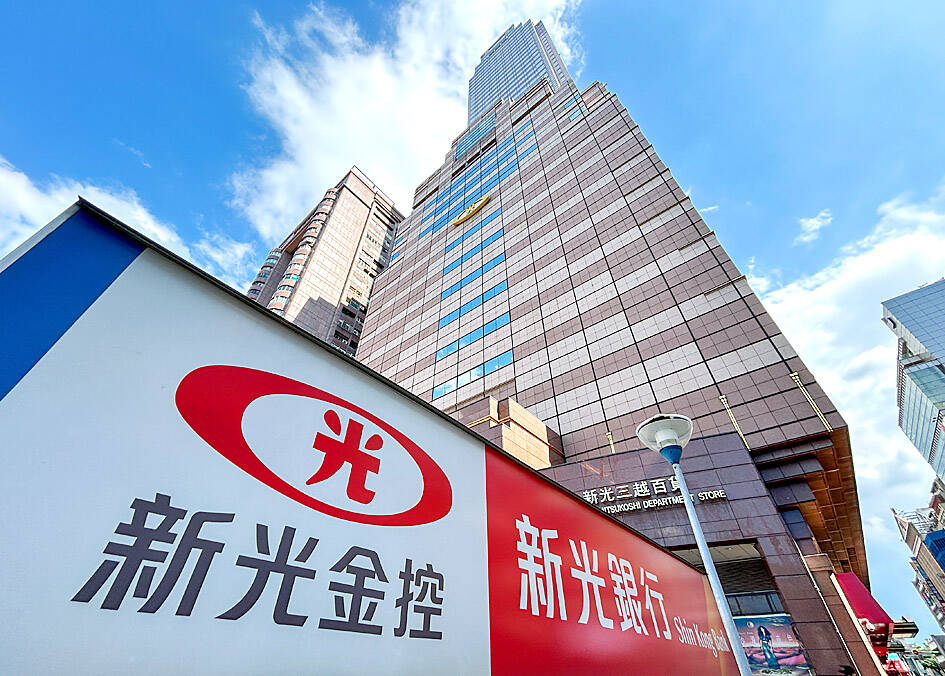Shin Kong Financial Holding Co (新光金控), Taiwan’s fifth-largest financial conglomerate, returned to a profit of NT$20.5 billion (US$639.39 million) in the first half of the year as it faces rival takeover bids.
The financial group’s insurance unit was helped by capital gains on stocks and improved hedging costs, it said in a statement yesterday.
Earnings per share of NT$1.32 compared with losses per share of NT$0.41 a year earlier.

Photo: CNA
Shin Kong is at the heart of a bidding war between CTBC Financial Holding Co (中信金控), which has offered about US$4.1 billion in cash and stock for a 51 percent stake, and a lower, mutually agreed deal with Taishin Financial Holding Co (台新金控).
Shin Kong Financial president Stephen Chen (陳恩光) yesterday said that the group’s preference was for a deal with Taishin Financial.
“Shin Kong wants a merger to deliver sustainable development and won’t necessarily prioritize a higher offer,” Chen said at an earnings conference in Taipei.
“Shin Kong has had a longer relationship with Taishin in terms of deal talks” and a successful “marriage” requires mutual understanding, he said.
Shin Kong Financial, whose founder was a brother of Taishin Financial’s founder, would keep discussing a merger with Taishin, including a potential tweak of their agreed share-swap ratio to make the deal more attractive, Chen said.
“There is only one consensus merger company for Shin Kong Financial, that’s Taishin Financial,” Shin Kong Financial said in a separate statement released at the conference, denouncing CTBC Financial’s offer as a “raid.”
The first-half result underscores the attraction of Shin Kong Financial, which had an uneven performance during the COVID-19 pandemic. A successful bid would help CTBC Financial vault over two bigger firms to become the nation’s biggest financial company.
At least five analysts had downgraded their recommendations on CTBC Financial stock after its bid last month on concerns that it is seeking a business that would need injections of capital and a lot of management attention.
Separate results last month from Shin Kong Financial’s life insurance unit showed its capital adequacy ratio had rebounded to above 200 percent, meeting regulatory requirements.

When an apartment comes up for rent in Germany’s big cities, hundreds of prospective tenants often queue down the street to view it, but the acute shortage of affordable housing is getting scant attention ahead of today’s snap general election. “Housing is one of the main problems for people, but nobody talks about it, nobody takes it seriously,” said Andreas Ibel, president of Build Europe, an association representing housing developers. Migration and the sluggish economy top the list of voters’ concerns, but analysts say housing policy fails to break through as returns on investment take time to register, making the

‘SILVER LINING’: Although the news caused TSMC to fall on the local market, an analyst said that as tariffs are not set to go into effect until April, there is still time for negotiations US President Donald Trump on Tuesday said that he would likely impose tariffs on semiconductor, automobile and pharmaceutical imports of about 25 percent, with an announcement coming as soon as April 2 in a move that would represent a dramatic widening of the US leader’s trade war. “I probably will tell you that on April 2, but it’ll be in the neighborhood of 25 percent,” Trump told reporters at his Mar-a-Lago club when asked about his plan for auto tariffs. Asked about similar levies on pharmaceutical drugs and semiconductors, the president said that “it’ll be 25 percent and higher, and it’ll

CHIP BOOM: Revenue for the semiconductor industry is set to reach US$1 trillion by 2032, opening up opportunities for the chip pacakging and testing company, it said ASE Technology Holding Co (日月光投控), the world’s largest provider of outsourced semiconductor assembly and test (OSAT) services, yesterday launched a new advanced manufacturing facility in Penang, Malaysia, aiming to meet growing demand for emerging technologies such as generative artificial intelligence (AI) applications. The US$300 million facility is a critical step in expanding ASE’s global footprint, offering an alternative for customers from the US, Europe, Japan, South Korea and China to assemble and test chips outside of Taiwan amid efforts to diversify supply chains. The plant, the company’s fifth in Malaysia, is part of a strategic expansion plan that would more than triple

Taiwanese artificial intelligence (AI) server makers are expected to make major investments in Texas in May after US President Donald Trump’s first 100 days in office and amid his rising tariff threats, Taiwan Electrical and Electronic Manufacturers’ Association (TEEMA, 台灣電子電機公會) chairman Richard Lee (李詩欽) said yesterday. The association led a delegation of seven AI server manufacturers to Washington, as well as the US states of California, Texas and New Mexico, to discuss land and tax issues, as Taiwanese firms speed up their production plans in the US with many of them seeing Texas as their top option for investment, Lee said. The